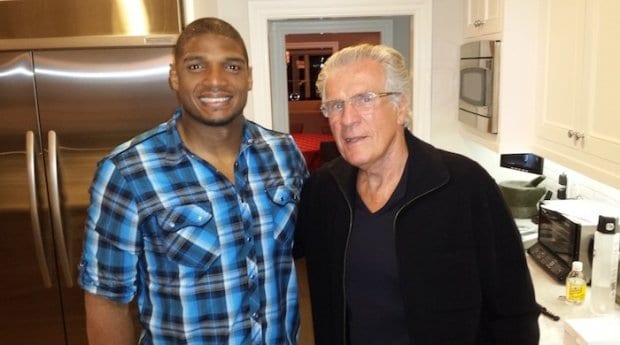For decades, you could count the number of openly gay North American professional athletes on one hand.
By 2011, just six gay male athletes from North America’s big four major leagues – the National Basketball Association, the National Hockey League, the National Football League and Major League Baseball – had come out publicly: LA Dodgers outfielder Glenn Burke (who died of AIDS in 1993), former MLB utility player Billy Bean, onetime NBA journeyman John Amaechi, and NFL players Roy Simmons, Esera Tuaolo and David Kopay. They all came out after retiring, except Burke, who was bullied out of pro baseball when he refused to go back into the closet.
So much has changed. Now it feels as if every week somewhere around the world, another gay athlete is coming out. And now they’re starting to come out in the prime of their careers; fans have given standing ovations to newly out players Robbie Rogers, of Major League Soccer’s LA Galaxy, and NBA Brooklyn Nets centre Jason Collins, who was recently named one of Time magazine’s 100 Most Influential People in the World for 2014.
But it all began with former NFL running back David Kopay — who was first offered a position with the Canadian Football League’s Montreal Alouettes before he signed with the San Francisco 49ers in 1964 — when he publicly came out in 1975 during what can only be called pro sports’ Jurassic era.
“American society has made a lot of progress in the last decade, and now the NFL is finally catching up with the rest of society,” Kopay says today. “I played for five teams in my [nine-year] NFL career, and the only team that has reached out to me [since] is the 49ers, to play in their old-timers’ game. And anybody who has played 10 years in the NFL should be a contender for a coaching position somewhere. But that didn’t happen for me. I didn’t get any interviews. I couldn’t even get a foot in the door.”
At the February 2013 NFL Scouting Combine — a yearly event where NFL teams evaluate eligible college football players for the upcoming NFL draft — college football player Nick Kasa revealed that NFL teams were asking potential draft picks about their sexuality.
“The NFL has been asking players that question for a long time,” Kopay says. “In a way, I have to admit that it’s okay, but not if it is used to discriminate against players who are gay.”
It’s one reason sports journalists began questioning whether University of Missouri defensive end Michael Sam would be offered an NFL contract after coming out publicly this past February, prior to the NFL draft, which begins on May 8.
To put it bluntly, will Sam’s coming out affect his draft stock?
“I told Michael he can do it,” Kopay says. “There are only seven rounds of draft now; when I played there were 20 rounds. I didn’t get drafted, and I ended up playing in the NFL for almost 10 years. Michael is the SEC defensive player of the year, and his former teammates supported and protected him after he came out. Michael also stood up for himself in a dysfunctional family. So I think he’s ready. He’s been through so much already; he looks at the closet and he doesn’t want that.”
Which is also why Kopay came out in 1975.
“I just couldn’t stay in the closet. I needed to feel free, feel alive, to express myself openly. I was even very close to coming out in 1972 when I was with the Green Bay Packers. I was so fed up with a couple of [teammates], and the [club] didn’t want me to attend the funeral of my [University of Washington fraternity brother Ray], who was killed in Vietnam. The team didn’t know the extent of our relationship — Ray was my soul mate — but I went anyway. I loved Ray more than anybody in the world,” Kopay says, tearing up. “That also motivated me to speak out. I feel like it is my way of contributing to the world, of being part of the world.”
Kopay dropped a bomb on the NFL with his autobiography, The David Kopay Story, which topped The New York Times bestseller list for several weeks in 1977.
Some years ago when he was introduced to Billie Jean King, Kopay told her, “There were so many times I wished you could have come out to tell your truth.”
Kopay says King replied, “But if it wasn’t for your book I don’t know if I would have gotten there.”
“That’s still unbelievable to me,” Kopay says, sighing.
Kopay’s autobiography also affected former Green Bay Packer and Atlanta Falcon Esera Tuaolo, who came out in 2002. “When David and I met for the first time, I bawled like a baby,” Tuaolo told this reporter afterward. “It was like, ‘You saved my life,’ and for David it was, ‘You are my confirmation.’”
“This all makes me feel very emotional,” says Kopay, who has willed his estate to create a million-dollar endowment fund for the University of Washington’s Q Center, an LGBT resource facility. Kopay’s personal archives — “everything from my [gay civil-rights speech] to the American Bar Association in 1975 to my NFL archives” — will also be donated to the university library.
Last year, Wade Davis, executive director of the You Can Play project, told Xtra, “I think that the first pro [NFL] player who comes out while he’s still playing is going to be extremely powerful. But that player needs to be ready, not just for all the great things that will happen, but also for all the negative reactions, especially [on the internet]. He will become the face of this movement and will inevitably influence the lives of so many gay youth about what it means to be a man. I [also] think his coming out has to be for the right reasons, not because he wants to become this gay icon.”
Kopay thinks Michael Sam is the right man at the right time.
“I’ve relied on my instincts for a long time, and I have a really good feeling about Michael,” Kopay says. “But all of this is still a crap shoot, it really is. If it’s not Michael, there will be another athlete who will be that player. But I think Michael will be drafted.”


 Why you can trust Xtra
Why you can trust Xtra


